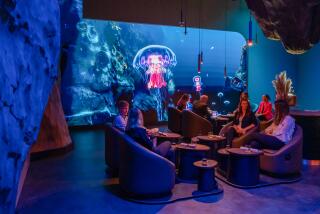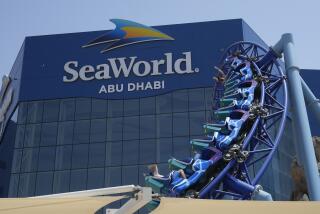What’s Brewing at Sea World for Anheuser-Busch?
- Share via
A tiny brewery at the Sea World aquatic park in San Diego would seem to be the last thing that Anheuser-Busch, the nation’s largest brewer, needs. After all, the king of brewers will produce 79 million barrels of its popular Budweiser, Busch and Michelob beers this year at its 12 breweries.
But Prohibition-era laws aimed at protecting consumers could force Anheuser-Busch, which controls 41% of the U.S. beer market, to build a microbrewery at Sea World. The relatively arcane laws, which date back to the 1930s, also might force Anheuser-Busch to build a brewery at its Sea World park in Florida and seek special legislative relief in Texas.
Simply put, the “tied-house” laws that have snagged Anheuser-Busch prohibit brewers, vintners and distillers from both manufacturing alcoholic beverages and selling them directly to the public at company-owned bars, restaurants and, evidently, aquatic theme parks.
“Experience and history showed that where the manufacturer owned the retail outlets, the public was not always served in a responsible manner,” said Manuel Espinoza, chief deputy director of the California Alcoholic Beverage Commission.
The rules, which were written in an era when breweries were relatively small operations, “don’t recognize modern business developments like conglomerates, which have new ways of doing business,” Espinoza said.
They certainly aren’t making life easier for Anheuser-Busch Cos. Inc., a multibillion-dollar holding company that this year will brew 79 million barrels of beer through its Anheuser-Busch Inc. subsidiary.
Anheuser-Busch, which owns more than half a dozen theme parks through its Busch Entertainment subsidiary, bumped into the “tied house” rules early in December when it spent $1.1 billion for Orlando, Fla.-based Harcourt Brace Jovanovich’s Sea World parks in San Diego, San Antonio, Orlando and Cleveland. In that deal, Anheuser-Busch also acquired HBJ’s Cypress Gardens water theme park in Winter Haven, Fla., and Boardwalk & Baseball, a Haines City, Fla., attraction.
The deal achieved Anheuser-Busch’s goal of rapidly expanding its growing theme park business.
But it also brought Anheuser-Busch head-to-head with the “tied-house” rules, which many states drafted during the 1930s to keep brewers and distillers from gaining control of the nation’s retail outlets.
While Anheuser-Busch is in technical violation of state laws in California, Texas and Florida, state regulators say it is unlikely the giant company will be prohibited from selling beer at the parks. (The tied-house rules are not a problem in Ohio, where Anheuser-Busch owns a fourth Sea World park.)
In California, Anheuser-Busch has “created a tied-house problem that’s going to have to be resolved,” Espinoza said. “We’re now in the middle of investigating the circumstances . . . but it doesn’t mean we have to close (alcohol sales) down.”
Anheuser-Busch was “very familiar with state liquor laws” when it began negotiating with HBJ, Anheuser-Busch Vice President W. Randolph Baker said last week. Anheuser-Busch completed the acquisition in early December with the expectation that the “sales issue could be dealt with at a later date,” he said.
“Sea World has served beer and other alcoholic beverages for many years to guests who wish to have these products available,” Baker said. “We don’t think (tied-house regulations were) intended to prevent an independent subsidiary from selling alcoholic beverages at a theme park like Sea World.”
Anheuser-Busch could eliminate its tied-house problems by eliminating alcoholic sales at the parks--a tack that theme park industry observers described as unlikely. Or it could work around the rules by leasing restaurant and refreshment operations at the parks to unrelated companies--an option that beverage industry analysts described as awkward in a theme-park setting.
Consequently, Anheuser-Busch has begun seeking regulatory and legislative exemptions that would loosen the rules enough to allow alcoholic beverage sales to continue at its newest parks.
One of the ways it could do this in California is by erecting a tiny brewery at Sea World in San Diego, according to state regulators. If built, the brewery--which would supply only a fraction of the beer sold at the park--would be accompanied by a special state permit that allows a brewer to sell beer at the brewery site.
Anheuser-Busch has already asked California’s ABC for permission to install a small brewery at Sea World, Baker said. With the brewery and the special brewing permit in hand, Anheuser-Busch could “continue to sell beer and wine under the law,” he said.
Espinoza said Anheuser-Busch will probably continue to sell alcoholic beverages at Sea World until the permit issue is resolved.
Anheuser-Busch has met with Florida officials, but has not reached any agreements that would end the tied-house problems, Baker said. However, state law might allow Anheuser-Busch to continue selling beer at the Sea World near Orlando if a small brewery is erected, according to John Harris, a spokesman for Florida’s Division of Alcoholic Beverages and Tobacco. The company already operates--and sells beer at--Busch Gardens, a Tampa-area park that includes a brewery, Harris said.
Florida regulators in the past have allowed brewers to sell their product directly to consumers if it helps to “promote tourism,” according to Harris.
In Texas, however, Anheuser-Busch evidently will need special legislation if it hopes to continue selling alcoholic beverages at the San Antonio park.
It could face an uphill fight in San Antonio, the home of the newest Sea World park. “I’d say we have the toughest rules in the country,” said Joe Darnall, general counsel for the Texas Alcoholic Beverage Commission.
While California legislators have granted nearly 40 retail exemptions to alcoholic beverage manufacturers, Texas has rarely granted exemptions, according to Darnall. So far, only a handful of companies in Texas’ fledgling wine industry, which is now allowed to sell products at their wineries, has successfully circumvented the tied-house laws, Darnall said.
“This could be a grass-roots issue . . . in a state that is half dry . . . but that recognizes Sea World as a state treasure,” Darnall said.
Anheuser-Busch is expected to seek an exemption from the rules during an upcoming special legislative session in March, Darnall said. However, the governor will set the Legislature’s agenda, and “the key (to Anheuser-Busch winning support) is going to be if there is a public perception that Sea World is a state treasure, more than just another tourist attraction,” Darnall said.
Legislation to exempt Anheuser-Busch would be carefully tailored to meet the company’s particular needs, rather than open the door to wholesale exemptions, Darnall said. “The proposed legislative concept would be an extremely narrow window that, for example, would define (the exemption) for a marine theme park of not less than 245 acres and not more than 255 acres,” Darnall said.
Texas state legislators early this year refused to grant an exemption sought by Grand Metropolitan PLC, a British distilling firm that acquired the Steak & Ale and Bennigan’s restaurant chains when it purchased Pillsbury’s. Grand Metropolitan, which faced similar tied-house restrictions elsewhere in the country, eventually sold off the restaurant chains.
The company has not run into tied-house rules in Ohio, where state law allows a holding company to both produce and retail beer if the operations are conducted by separate and distinct subsidiaries.
Anheuser-Busch’s brewing subsidiary sells its popular Budweiser, Busch and Michelob products to distributors who in turn sell them to retailers. Its park holdings are owned and operated by Busch Entertainment Corp., a separate corporation.
Beer sales at the Sea World parks “amount to a minuscule part of their business,” according to Paul Gillette, who edits a Los Angeles-based beverage industry newsletter. “They probably spill more in the brewery than they sell in the parks.”
But the nation’s largest brewer “wants the ability to sell their beer in the parks for the promotional value,” Gillette said. “That’s the only reason for them to pursue” the tied-house exemptions.
Sea World, which now offers Anheuser-Busch beers as well as other brands at all of its parks, will continue to give its customers a choice of competing beer brands, Baker said.
More to Read
Inside the business of entertainment
The Wide Shot brings you news, analysis and insights on everything from streaming wars to production — and what it all means for the future.
You may occasionally receive promotional content from the Los Angeles Times.









